‘Shutter Island’
Directed by Martin Scrosese. Starring Leonardo DiCaprio, Mark Ruffalo, and Ben Kingsley
by John Carvill
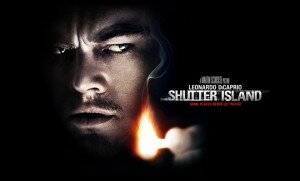
“What do you think you are, for Christ’s sake, crazy or something? Well, you’re not. You’re not! You’re no crazier than the average asshole out walking around on the streets, and that’s it.”
- Randle P. McMurphy, ‘One Flew Over the Cuckoo’s Nest’
What’s eating Martin Scorsese? For a while there, the critical consensus seemed to be that, despite a fathomless reservoir of raw talent, the best and brightest of the so-called Seventies ‘movie brats’ had one fatal flaw, one which could be summarised in just three words: “too many gangsters”.
Scorsese’s best work had confined itself to a milieu which his own childhood in Little Italy had made him both comfortable with, and an incisive critic of: he knew whereof he spoke – maybe better than those he spoke of (and for) knew themselves. But when he ventured into less familiar territory, he seemed to have insuperable difficulties in bringing his vast creative resources into focus; he was like an exquisitely engineered car, with an enormously powerful engine, that was forever stuck in first gear.
This wasn’t ever an entirely fair or accurate view of the man’s work – fire up his filmography on IMDb or allmovie.com, and remind yourself that films such as ‘Kundun’, ‘After Hours’, or even ‘The King of Comedy’ weren’t exactly born out of classic Scorsesean subjects – yet still the perception persisted that Scorsese lacked range, and, worse still, was experiencing diminishing returns from the one area he did do well in. ‘Goodfellas’, so the received wisdom ran, wasn’t quite as accomplished a work as ‘Raging Bull’; ‘Casino’ wasn’t a patch on ‘Goodfellas’; and so forth. As for ‘The Departed’? Fuggedaboudit!
Around the time of ‘The Aviator’, another critical cri de coeur began to supersede the old ‘enough with the hoodlums’ routine: fans and critics found themselves united in their perplexity over a problem which, this time, could be boiled down to an even more succinct, two-word summary: “Leonardo DiCaprio”. You went from Robert De Niro to this little whelp? Jesus, what were you thinking! DiCaprio had seemed so far out of his depth in ‘Gangs of New York’ that he could have signed up with BP and helped with their off-shore drilling. And now Scorsese wanted him to portray Howard Hughes? Are you back on the coke, Marty, or what?
The other curveball Scorsese served up for his admirers was a renegotiation of the Faustian bargain he had signed with the art-averse suits and bean-counters who control the Studios. Formerly, Scorsese had occasionally agreed to turn out a schlocky mainstream thriller, such as ‘Cape Fear’, in return for the opportunity of making more personal, less box office-friendly films. Instead of keeping both these separate strands in play, Scorsese was now trying to find a way of weaving them together to form a sort of hybrid or ‘third way’ mode of filmmaking. It was a risk. Could he direct big-budget, mainstream movies, and still retain enough of his essential Scorsese-ness to make the enterprise worthwhile, and to retain sufficient self-respect and artistic passion? Like many of the best artists, in any field, one of Scorsese’s key qualities has always been his unpredictability; nevertheless, who could have guessed that he would ever become a maker of mainstream Hollywood movies? That he has done so so effectively – and even won a long-overdue Oscar in the process – is less surprising, since it would be hard to conceive of any type of filmmaking Scorsese might not be ferociously adept at. But he has yet to convince his hard-core fans that the sacrifice has been worth it.
A slick, mainstream psychological thriller, starring Leonardo DiCaprio, ‘Shutter Island’ thus represents a continuation of both these worrying trends. Based on a best-selling novel by Dennis Lehane, the film presents themes and plotlines which are (on the surface, at least) conventional almost to the point of self-parody, especially when flavoured with a hint of pastiche and served up with a generous dash of gothic ambience. This is never more strongly felt than in the film’s opening scenes, as we watch US Marshall Teddy Daniels (Leonardo DiCaprio) and his new partner, Chuck Aule (Mark Ruffalo), arrive by boat at the titular Shutter Island, home to a correctional institution for the criminally insane – run by inscrutable Chief Psychiatrist Dr John Cawley (Ben Kingsley) – from which an inmate, Rachel Solando (Emily Mortimer), has recently escaped. The air of ominousness is pushed to the brink of hilarity by the intentionally over-wrought music, and the pulpish, B-movie dialogue. A storm begins to brew as the Marshalls approach the island, and the boat’s captain darkly informs them that the dock onto which they will shortly be disembarking is “the only way on. Or off”. We get the feeling that all this is meant to be in deadly earnest, yet it’s difficult not to see the funny side.
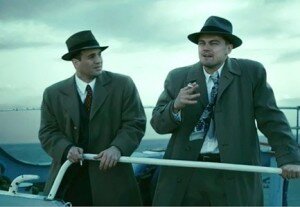
This feeling – that the film may be teetering on the brink of being an outright comedy-horror – reaches a crescendo (as does the music) when the officers approach the double set of prison gates, surrounded by grim-faced, gun-toting guards. For a minute or so, as the portentousness builds and the music blares from the cinema speakers, the audience is faced with the mind-scrambling possibility that Martin Scorsese has made his version of Mel Brooks’s ‘High Anxiety’. Once the film gets properly underway, however, the comedic aspects recede, their place taken by an unmistakeable air of menace. Teddy Daniels’s rock-solid confidence that the actual and ostensible reasons for his trip to the island are in accordance begins to erode, slowly at first and then exponentially faster, eventually leaving him questioning his own sanity. What looked at first to be a fairly heavy-handed treatment of the old ‘are they out to get me?’ trope instead becomes a revelatory demonstration of Martin Scorsese’s mastery of tension and suspense. The multilayered manner in which a sense of claustrophobic paranoia is built up – and the audience’s incremental realisation that they have made a series of not necessarily accurate assumptions – recall Alfred Hitchcock at his suspenseful best.
Scorsese revels in stuffing his films full of filmic references, and often treats his casts to screenings of classic Hollywood movies, to give them a flavour of what he’s aiming at. This time, these included ‘Cat People’, ‘Isle of the Dead’, and ‘Laura’. He also showed them ‘Out of the Past’ which, surprisingly, neither Kingsley nor DiCaprio had ever seen before. Part of the fun to be had from repeat viewings of Scorsese films lies in trying to spot the less obvious references as they go by. One of the most fleeting is a playful allusion to ‘The Wizard of Oz’: as the plot thickens and the weather on the island worsens, the Marshalls shroud themselves in military-style ponchos, and set out across the fields and forests, ostensibly searching for the missing inmate, Rachel Solando (remember her?), while actually spending more time discussing Teddy Daniels’s suspicions about what’s ‘really’ going on. As they battle their way through the storm, wind and rain lashing their eyes and trees crashing down around them, Aule shouts out that they should find some sort of shelter, because, “It’s turning into fucking Kansas out here!”
Less subtle is a camera shot angled straight up into an open shower head, unmistakably recalling ‘Psycho’ (far from the first time Scorsese has homaged that image, incidentally). Indeed, if there’s any one director who provides a touchstone for ‘Shutter Island’, then it has to be Hitchcock. There are hints here of any number of Hitchcock films, including ‘North by Northwest’, ‘Marnie’, and ‘Spellbound’. Primarily, though, we’re reminded, both generally and specifically, of ‘Vertigo’. To say more would be inappropriate in such a quick, relatively spoiler-free review; more considered appraisals of the film will, no doubt, have a good deal to add on this matter. Needless to say, ‘Vertigo’ – a film about obsession, and one with which Scorsese himself has admitted being obsessed – was high on the list of films Scorsese set as key texts for his actors.
We’re also unavoidably reminded of ‘One Flew Over the Cuckoo’s Nest’, what with all the talk of lobotomies, and the debate between traditional methods of treating (or, more accurately, subduing) mental patients, and more progressive approaches which seek to understand, and even cure. This dovetails nicely with the fact that Leonardo DiCaprio has (to put it politely) borrowed quite a few mannerisms and inflections from Jack Nicholson. This has been surprisingly little remarked upon in the press, but the fact remains: now and then this phenomenon, at its most extreme, sees DiCaprio almost lapsing into a full-on Jack Nicholson impression. It’s not as pronounced here as it was in, say, ‘Revolutionary Road’, but it’s there, nonetheless, and can occasionally be distracting.
That said, DiCaprio increasingly looks to have been a winning bet for Scorsese. Up until recently – say, just before DiCaprio helped Scorsese finally win his Best Director Oscar for ‘The Departed’ – the jury was still very much out on whether Scorsese’s adoption of DiCaprio as his lead actor was a mark of unusually prescient judgement or just a sad sign of declining acuity. Filling De Niro’s shoes may be such an impossible task that, in a sense, the pressure is off: it can’t be done, therefore you can’t be criticised for not managing it. Ironically, it was reportedly De Niro himself who first brought DiCaprio to Scorsese’s attention, having worked with him on ‘This Boy’s Life’.
DiCaprio’s performance style – Nicholson impressions notwithstanding – has matured at a remarkable rate, and few could now deny that he can lay claim to being deserving of his place in Scorsese’s late period works, not to mention the top of the movie star hierarchy. He feels like an actor who has a great many interesting performances still to give, and his work in ‘Shutter Island’ represents, unquestionably, one of the high points of his career so far.
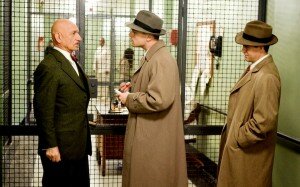
He’s not alone. Ben Kingsley turns in yet another suave, infinitely nuanced performance, and he’s certainly the actor who most resonantly and enjoyably embodies the film’s opening mood of semi-pastiche. You half expect him, on first being introduced, to launch into a classic Scooby-Doo-style evil laugh, or an announcement that, “We have been expecting you”. Eloquent, urbane, the shine in his eyes matched by the glint off his ostentations pinkie ring, he delivers his archest, most potentially comic lines with a hint of menace; conversely, his most sombre pronouncements are accompanied with a barely perceptible eye twinkle. Up until the very end, we’re never allowed to settle on a firm view as to whether he is a kind of pantomime villain or a benign, misunderstood genius, far ahead of his time. Mark Ruffalo’s performance (and role) falls somewhere between the two opposing poles of Kingsley and DiCaprio. It’s a much lower-key performance than his career-solidifyingly brilliant turn as Detective Dave Toschi in David Fincher’s ‘Zodiac’, but it’s solid and subtle, and reveals itself more in retrospect than on first viewing, Ruffalo sure-footedly walking a fine line between conflicting aspects of his deceptively complex character.
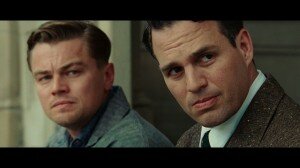
The stellar supporting cast includes already famous names such as Emily Mortimer, Michelle Williams, Patricia Clarkson, and – in a characteristically delightful cameo – Max Von Sydow, all of whom acquit themselves impeccably. Less well-known, but equally deserving of credit, are: John Carroll Lynch as salty-voiced Deputy Warden McPherson; Jackie Earle Haley as maximum security inmate George Noyce; Nellie Sciutto as sassy Nurse Marino (her third Scorsese/DiCaprio film, fact fans); and, particularly, Robin Bartlett as the wise-cracking, kindly-faced axe murderer Bridget Kearns. Williams and Sciutto could perhaps have been given more to do, but what they have been given they do wonderfully well.
As with all the classic movie references, it will probably take a while for the smoke to clear and the significance of the various motifs which permeate the film to be decrypted. There are recurrent incidences of ominous darkness and even more ominous bright lights, accompanied by bouts of photosensitivity, migraines, and traumatic flashbacks. Most strikingly, there is the repeated visual device of falling: swirling pages in a Nazi death camp commandant’s office; snowfalls; and the showers of ash flakes which fill the room when DiCaprio dreams of his deceased wife who, we’re told, was killed in a fire started by a pyromaniac. Questions are raised about what is real, what is delusion, and who can be trusted to tell the difference. There’s also a dollop of cold-war paranoia, with suggested connections between the doctors of Shutter Island and the activities of the House Un-American Activities Committee (HUAC), mind-control programmes, psychotropic drugs, and experiments carried out on prisoners in Nazi Germany.
There are vague but gathering suggestions that Teddy Daniels’s experiences during the war – he was present at the liberation of Dachau – played some part in the tragedy which befell him and his wife; and this presents itself as a metaphor for what might have gone wrong with the world. This cause-and-effect theme is foreshadowed early on, when Daniels tells his partner about his wife’s death: “it was the smoke that got her, not the fire, so that’s… that’s important”.
There are none of Scorsese’s lovingly choreographed tracking shots, except for one brief sequence where the camera pans along behind a row of Nazi death camp guards as they’re gunned down by nervy American GI’s at Dachau. Towards the end of the film, when some of the mysteries begin to unravel, we are treated to some quite upsetting scenes, enough in fact to make it seem surprising that this film was granted a ‘15’ certificate in the UK. Coming so late in such an enjoyable film – because that’s what this is, above all: a thoroughly enjoyable cinematic experience – these can seem somewhat jarring; sitting in the middle of an audience, you can almost hear an army of hands gingerly withdrawing from their popcorn cartons.
What else? Well, the music, set design, costumes, and cinematography combine fantastically to create a look-and-feel which is simultaneously rigorously authentic and otherworldly. There’s a plot twist at the end, and man, do some people seem to enjoy complaining about its predictability. But come on, aren’t twists always either predictable, and/or preposterous? Plus, look again: there may be a twist within a twist, and, anyway, what does it matter?
Scorsese’s career is now in an interesting phase. His critical and commercial success are sliding increasingly out of synch. The respect he still commands, from critics and fans, is based on the legacy of his earlier works; but his commercial viability (which, whatever you view of this or any other film, is everything in today’s Hollywood) derives from the films he’s made which least please his most assiduous adherents. The trick now will be to reconcile these two opposing groups. It’s notable, however, that Scorsese is gaining a new audience, one which doesn’t care (or even know) that the great man got repeatedly screwed out of his rightful Best Director Oscar.
Whatever his more wilfully snobbish fans may think, Martin Scorsese never wanted to spend his career scrabbling around in some sort of indie ghetto, making marginal films designed to gratify the tastes of people who make a fetish out of disdaining the mainstream; Scorsese wanted to be the mainstream. He has always aimed to make big budget films – his big ideas require big budgets – it’s just that he aimed to make big budget films with a highly personal sensibility at their core. As Roger Ebert (one of Scorsese’s more simpatico critics) has pointed out, “there is nothing in Scorsese’s portfolio to suggest he enjoyed living hand-to-mouth with independent productions, and everything to show his admiration for the studio golden age.”
Around the time of ‘Cape Fear’, Scorsese claimed that he didn’t make “thrillers or genre films” because he was incapable of summoning the requisite “humility” to do so. ‘Cape Fear’ is certainly a deeply flawed work, one which seems very dated now; it’s not a film that repays much repeated viewing or reconsideration, and in fact it now feels somehow discrete, shut off from the rest of Scorsese’s career and, indeed, from modern cinema. Scorsese made it (for whatever reasons, with whatever intentions); we watched it; and then it began to recede, rapidly, into the past. But it was a commercial success, and it demonstrated, as Ebert rightly points out, that Scorsese was (or could be) “a master of a traditional Hollywood genre who is able to mold it to his own themes and obsessions.”
‘Cape Fear’, Ebert said, represented “the Scorsese touch on a genre piece, rather than a film torn out of the director’s soul”. That would make for a reasonably fitting description of ‘Shutter Island’. The fact that it is unquestionably a genre film – or, more accurately, a film which conflates a number of genres – has led to it being seen in some quarters as a case of Scorsese ‘slumming it’. In some ways, these criticisms recall the gripes which greeted the publication of Thomas Pynchon’s recent ‘psychedelic noir’ novel, ‘Inherent Vice’, a case of a superior talent ‘wasting’ his resources on a piece of work that’s way beneath his artistic station, however well constructed and stylishly executed it may be.
So where does this film fit, on the scale between the kind of film Scorsese would ideally like to make, and the sort of thing the studios want to see him deliver? It’s not top-tier Scorsese by any means, but it’s a much better film than ‘Cape Fear’, that’s for sure. On the other hand, it’s not as important a work as ‘The Departed’; it’s more equivalent to, say, ‘After Hours’: an enjoyable detour along the way towards…….where, exactly?
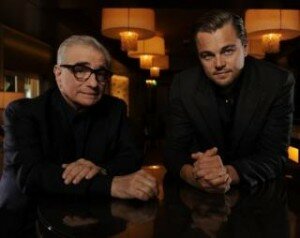
Back in the Seventies, Scorsese’s generation of ‘auteur’ filmmakers – the former film students and obsessive enthusiasts who briefly held sway over the Studio system – got their chance because the ‘Old Hollywood’ was beginning to crumble. The Studios were creatively bankrupt, and were heading that way financially, too. Filmmakers who wanted to also be artists were, briefly, welcomed into the fold. Today, Hollywood is probably more blockbuster-driven than at any time in its history, and more impervious than ever to any notion that art should coexist with, let alone take precedence over, commerce. But ‘Shutter Island’ has been a big box-office hit, which means Scorsese now has a degree of commercial clout that, only half a decade ago, would have seemed forever out of reach. Consider the happy fact that Scorsese’s controversial alliance with DiCaprio has coincided with the actor’s ascent to the very pinnacle of Hollywood royalty. Bear in mind also that DiCaprio’s star has continued to rise even since ‘Shutter Island’ was made. Money talks, and if DiCaprio can help Scorsese’s voice (and artistic vision) carry through the Mammonian canyons of Hollywood, so much the better.
Who knows where the alliance between world’s biggest movie star and its most talented director may lead? The movie nuts may stand no chance of ever taking over the Hollywood asylum again, but maybe they’ll be allowed out on day release now and then.
‘Shutter Island’, being a Scorsese movie, has been reviewed by just about every print and online publication in the Western world. If you’re interested in hearing what Scorsese, Kingsley, and DiCaprio have to say about it, the podcast of the Press Conference held to publicise the film is available from Dan Persons’s ‘Mighty Movie Podcaset’, here:
Shutter Island Press Conference
Roger Ebert’s book, ‘Scorsese by Ebert’, should be mandatory reading for anybody interested in Martin Scorsese. It’s now available in paperback: